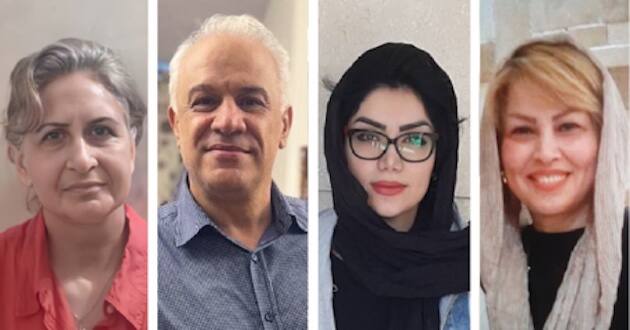Ministries report mosques closing, Iranians coming to Christ

Not all of the news coming out of Iran is bad. A million Iranians have accepted Christ as tens of thousands of mosques in the Islamic country have closed, according to reports from multiple ministries in the region.

In February, a senior Iranian cleric, Mohammad Abolghassem Doulabi, according to the Iran International, a UK-based news outlet focusing on the country. It reported that the cleric “revealed that 50,000 out of 75,000 mosques nationwide had been closed due to a significant decline in attendance. Doulabi, an intermediary between the late President Ebrahim Raisi’s administration and the country’s seminaries, expressed concern over the fall and its implications for a state founded on Islamic principles.”
The closures bring hope to others.
“You have a country with one of the highest drug addiction rates in the world,” Todd Nettleton, vice president of The Voice of the Martyrs, says. “You have a country where corruption runs rampant. You have a country where more than half the people live below the poverty line. And the people of Iran are looking at this, and they are saying, ‘Wait a minute. If this is what Islam has brought us in the last 45 years, we’re not interested. We want to know what the other options are.'”
Metro Voice has previously reported on Iranians both finding Christ and being executed for their decision.
The story of the church in Iran is both tragic and encouraging. After the 1979 Iranian revolution brought the Islamic regime to power, the tiny church faced increased persecution on all fronts. At the time, all missionaries were forced to leave and any type of evangelism was outlawed. Not just public evangelism, but private one-on-one discussions of the redeeming power of Christ. At the same time, according to the ministry Elam, Bibles were outlawed, pastors were murdered and the church went underground.
Some thought the church would die but the opposite has happened in the ensuing 45 years. The church has found a receptive audience in Iran’s young people. “Despite continued hostility from the late 1970s until now, Iranians have become the Muslim people most open to the Gospel in the Middle East,” Elam reports.
A survey of Iranians from the Netherlands-based Gamaan Institute found that 80 percent reject the Islamic Republic and want a democratic government. The potential of a “Jesus revolution” within Iran has sparked pushback from the Islamic government, Nettleton said.
“This is not something that is making the regime happy,” he told CBN News. “And really, in many ways, they are seeking to solidify their power and to crush any kind of dissent. We have heard multiple stories this year of Bible study, a home church being raided. Everyone there is photographed, everyone there is questioned. But then the leader of the meeting is held onto. They are arrested. They are detained, they’re put in prison.”
Don Shenk, executive director of The Tide ministry, said Muslims are responding to gospel-centered messages that are broadcast into Iran.
“We get responses from listeners who say, ‘Now I understand that God loves me. I always thought that God wanted to punish me,'” he said. “And I think there’s an awakening that is taking place across the Muslim world, not just in Iran.”
Elam reports that “more Iranians have become Christians in the last 20 years than in the previous 13 centuries put together since Islam came to Iran. In 1979, there were an estimated 500 Christians from a Muslim background in Iran. Today, there are hundreds of thousands—some say more than 1 million. Whatever the exact number, many Iranians are turning to Jesus as Lord and Savior.”
Shenk’s ministry reported in a blog that “what is happening in Iran is just the tip of the iceberg, as similar movements to Christ are happening across the Muslim world. There is one common thread across these testimonies of Jesus appearing to Muslims in dreams: the dreams by themselves do not immediately result in conversion. Rather, they are a step in the spiritual journey, where the Lord breaks down some of the barriers which were the result of growing up in the Islamic faith. After receiving these dreams, these Muslims are often led to believers who engage them relationally.”
Article18, a non-profit organization based in London, says it is “dedicated to the protection and promotion of religious freedom in Iran and advocating on behalf of its persecuted Christians.” The organization outlined a report by the United Nations’ Fact-Finding Mission which said persecution of Christians during the pro-women protests over the last two years has intensified. In its 2023 Joint Annual Report on Rights Violation Against Christians in Iran, the U.N. Mission reported the “repression of Christians, especially converts, intensified during the protests, while many Christians who participated were threatened, and at least five converts who were arrested faced the additional charge of “apostasy” after their Christian faith came to light through examination of their phone records.”
Children have been hit particularly when their parents are arrested or worse. “In the crackdown, ‘children belonging to ethnic and religious minorities suffered particularly egregious violations,”’the Mission says, “including killings and maiming, arrests, enforced disappearances, detention, as well as torture and rape and other forms of sexual violence, resulting in lasting harm.”
In a high-profile case, an Iranian pastor and four Christian converts from Islam have lost their appeals against jail terms and fines imposed because of their involvement in “house churches” reports Barnabas Aid. Pastor Joseph Shahbazian, 58, an Iranian-Armenian, was sentenced in June 2022 to ten years in jail, while converts Mina, 59, and Malihe, 48, were ordered to serve six years. Masoumeh and her daughter Somayeh were sentenced to jail, but permitted instead to pay fines of $1,100 to $1,751.
Shahbazian, Mina and Malihe remain in prison. Barnabus Aid asks readers to pray they receive the courage to endure their time in prison, and that their faith will be an inspiration to other prisoners.
Still, the stories of torture, rape, imprisonment and murder are not detracting Iranians from seeking Christ and has only served to embolden those who have found him.
“Suffering has not destroyed the church in Iran. Rather, suffering has deepened its dependence on God, which in turn has increased its endurance, character, and hope,” says Elam’s executive director David Yeghnazar.
–Dwight Widaman






